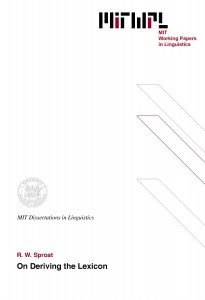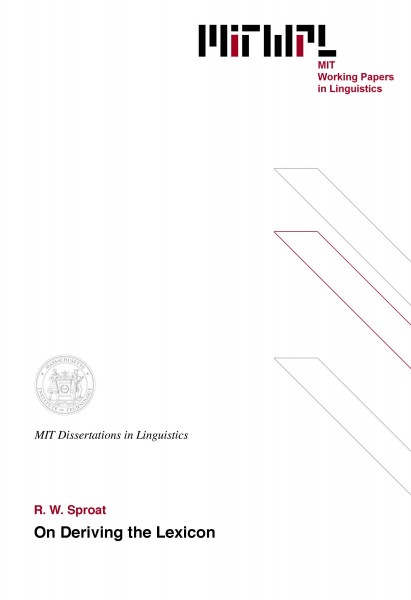On Deriving the Lexicon
R. W. Sproat, 1985
In this thesis I argue against the view that there is a separate word-formation component of the grammar, a component which has usually been termed the "Lexicon" in the recent morphological literature. I argue rather that the lexicon is what has been called the permanent lexicon, namely the data structure containing the information about stems and affixes and idiosyncratic compositions of the language, and that word formation is actually split between the syntax and the phonology in that it is principles of syntax which determine the syntactic well-formedness of words, and principles of phonology which determine phonological well-formedness.
In the first chapter I argue that morphological bracketing paradoxes, including phonological cliticization provide crucial evidence that words must have at least two levels of representation, in particular a syntactic on and a phonological one. I show that a simple Mapping Principle governs the relationship between the two levels of representation. Subsequently, in Chapters 2 and 3 I show that the syntactic well-formedness and behavior of a word, like that of a phrase, can be determined by syntactic principles including, but not limited to, X-bar theory, theta-theory, binding theory, case theory and the Projection Principle.
In Chapter 4 it is argued that lexical phonology is not in principle distinct from what has come to be termed post-lexical phonology, in that principles such as Cyclicity and Bracketing Erasure, which have generally been argued to be hallmarks of lexical phonology are either not needed or not unique to lexical phonology. I argue too that the theory of Lexical Phonology cannot be taken to be a thoery of word formation, but at most a theory of phonological well-formedness. I propose an alternative to Lexical Phonology based upon the distinction between phonological words and stems.
Finally, in the fifth chapter I summarize the psychological evidence pertaining to word-formation. I argue that the approach to morphology taken here is at least as compatible with such evidence as other theories of word-formation, such as Lexical Phonology. I also discuss some residual conceptual issues raised by the approach taken in this thesis.
Thesis supervisor: Kenneth Locke Hale
Title: Ferrari P. Ward Professor of Linguistics
Table of Contents
Chapter 1 On bracketing paradoxes: the mapping between S-structure and PF 15
1.1 Bracketing paradoxes 15
1.1.1 An introduction 15
1.1.2 Siegel"s theory of ordering 17
1.1.3 Allen"s treatment of un- 23
1.1.4 Fabb"s analysis and an argument against Fabb and Allen 27
1.1.5 Pesetsky (1979) 33
1.1.6 Williams (1981) 38
1.1.7 Strauss (1982b) 41
1.1.8 Guerssel (1985) 43
1.1.9 Kiparsky (1983) 45
1.1.10 Pesetsky again 51
1.1.11 A summary so far 65
1.2 The mapping from syntax to PF 66
1.2.1 Background: the model of grammar 66
1.2.2 The condition on mapping between S-structure and PF 78
1.2.3 Simple cases of bracketing paradoxes 85
1.3 Handling bracketing paradoxes 88
1.3.1 Handling Pesetsky"s data 88
1.3.1.1 No reordering in analysis 88
1.3.1.2 Idiosyncratically interpreted words 96
1.3.2 Kiparsky"s examples 97
1.3.3 The affixation of "ity 103
1.4 More on the Mapping Principle 108
1.4.1 A curious piece of English morphology 109
1.4.2 Rebracketing of separate words 113
1.4.2.1 Consonant mutation in Welsh 114
1.4.2.2 Other "locality" phenomena 120
1.5 On some cases which might seem to support morphological QR 123
1.5.1 Morphological QR in Navajo? 123
1.5.2 Other cases like Navajo 133
1.6 Conclusions and a prospectus 137
Appendix Some further consequences of the Mapping Principle 139
1 A further consequence of the mathematical properties of * and ` 139
2 On examples of stratum I prefixes outside stratum II suffixes in
English 141
3 Another possible example of morpheme doubling 143
Chapter 2 Syntax and semantics of productive deverbal morphology 147
2.1 Introduction 147
2.2 Background: Higginbotham (1985b) and Chomsky (1984) 149
2.2.1 Higginbotham"s semantics 149
2.2.2 Chomsky (1984) 159
2.3 The formation of agent nominals 164
2.3.1 Introduction 164
2.3.2 -Er affixation 166
2.3.3 Projection, projection and theta indexing 182
2.3.4 On binding in "er NPs 191
2.3.5 On synthetic compounding 195
2.3.5.1 The X-bar status of synthetic compounds 195
2.3.5.2 Theta marking within minimal projections 202
2.3.5.3 On the application of the projection principle within
synthetic compounds 207
2.3.5.4 Case assignment in synthetic compounds 209
2.3.6 A short history of the study of synthetic compounding and
a comparison with Lieber (1983) 214
2.3.7 A short note on Chichewa synthetic compounds 225
2.4 The syntax and semantics of the derived nominals 235
2.4.1 The secret of NOM: the morphological relationship
between Verbs and Derived nominals 238
2.4.1.1 The derived nominal"s reference to an event: some
consequences 242
2.4.1.2 The discharge of the internal theta role 246
2.4.1.3 On the discharge of the external theta role 257
2.4.1.4 Some problems with and predictions of the model 264
2.4.2 Not all derived nominals are created equal 280
2.4.3 A discussion of Lebeaux (1984) 286
2.5 Concering self-analysis 289
2.5.1 -Er forms with self 293
2.5.2 Self- in derived nominals 297
2.5.3 Self- prefixation to nouns and adjectives 301
2.6 Extensions of the theory 306
2.6.1 A short discussion of adjectival passives 306
2.6.2 On deadjectival nominals 313
2.7 Conclusion; overview and prospectus 317
Chapter 3 Anaphoric islandhood 326
3.1 Introduction 326
3.2 Simpson (1983) 329
3.3 On the non-referentiality of subparts of words 335
3.3.1 Pronouns and NP anaphors 335
3.3.2 Non-anaphoric-islandhood with submaximal projections:
some examples 339
3.3.3 When maximal projections do occur within "lexical"
constructions 345
3.4 A summing up 350
Chapter 4 Concerning Lexical Phonology 352
4.1 Introduction 352
4.1.1 A brief overview of LPM 353
4.1.2 LPM as a theory of phonological well-formedness 358
4.2 Against LPM as a theory of word-formation 365
4.2.1 Morphological blocking and stratum ordering 366
4.2.2 On the stratum ordering of compounds 371
4.2.2.1 Inflection of verbal compounds 371
4.2.2.2 Inflection of nominal compounds 378
4.2.2.3 Malayalam subcompounding and cocompounding 382
4.2.2.4 Inflections within English compounds 412
4.3 On the phonology of lexical phonology 427
4.3.1 What are the principles of Lexical Phonology? 427
4.3.1.1 Bracketing Erasure 428
4.3.1.2 On cyclicity in Lexical Phonology 444
4.3.1.3 Structure preservation 448
4.3.2 A sketch of an alternative to Lexical Phonology 459
4.3.2.1 Advantages of stem/word morphophonolgy 460
4.3.2.2 Stem/word morphology and the Mapping Principle 468
Chapter 5 Some Final Points 472
5.1 Some theoretical issues 473
5.1.1 Morphological blocking 473
5.1.2 What is a component? 480
5.1.3 On the Projection Principle 487
5.2 Psychological issues 491
5.2.1 On productivity, listing and the separation of word-
formation from the rest of Linguistic knowledge: what is
the relationship between the theory of morphology and my knowledge of words? 491
5.2.2 On the psychological reality of the lexical level 499
5.2.2.1 Speech errors 500
5.2.2.2 Language games 501
5.2.2.3 Speech recognition 502
5.3 Some general conclusions and a prospectus 505

